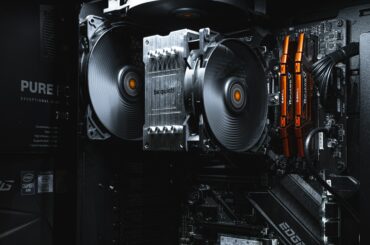Orbi backhaul is a link that enhances the capacity and data access rates of your Orbi satellites and routers. Both cable and wireless backhauls possess benefits and drawbacks; therefore, it is up to the clients to choose the manner in which their link to be set up. Since people are rushing to the web without knowing whether they will benefit from wired or wireless backhaul, we will explain orbi ethernet backhaul vs. wireless: which is better? And a complete detailing of Ethernet and wireless backhaul and their benifits. So let us get started.
What is Ethernet Backhaul?
Ethernet backhaul or wired backhaul involves employing coaxial cables or Ethernet lines to link your Orbi device in order to transport information and establish links between the router and the satellites.
An Ethernet backhaul network allows you to establish a direct link between your wifi network and satellites. As a consequence, you may interact with your network and satellites without consuming wifi bandwidth.
Use an Ethernet code to link the Ethernet ports on your mesh router and mesh satellite in order to establish a wired Ethernet backhaul communication.
Wired backhauls are ideal for those seeking a steady and reliable link since they perform better than cordless devices in terms of reliability and higher internet speed.
Wired backhaul also isn’t impacted by interruption, in contrast to cordless backhaul, yet it’s more prone to hardware problems. They are typically susceptible to damaged cables or poor connections, which are typically harder to find.
Using an ethernet cable has the benefit of greater internet speeds. Coaxial cables are more dependable than cordless backhaul, so you may anticipate consistent and comparatively quicker transfer rates. Due to decreased interruption, your internet access will also be better and more dependable.
The cost of wired networks is much higher than the cost of wireless transmission. Also, it would take longer to place them and locate a good place for them.
What are the Benefits of Ethernet Backhaul?
Ofcourse, the stable and faster internet speed is the benefits of ethernet backhaul. However, The configuration is more costly than the cordless alternative. Still, wired backhaul, which generally uses optic, Ethernet, or coaxial cables to transport data, enables customers almost infinite bandwidth with no upkeep.
The setup and gear costs for cable systems are higher than those for cordless backhaul. Also, corporations are technically constrained by where cable may be installed, which makes it harder to grow fast than with cordless connectivity.
The following advantages of ethernet backhaul:
- Improved Maximum Connection Speeds: In contrast to wireless connectivity, enterprises may provide end customers with better data transfer speeds thanks to cable backhaul solutions.
- A Stronger Connection: Companies using cabled backhaul benefit from a faster and more dependable link than those using cordless backhaul, in part because there’s a smaller amount of network interruption.
What is Wireless Backhaul?
Wireless backhaul involves employing cordless networking methods to transmit data between the web and subnets. It can assist in cutting out the requirement for actual wiring within a company or phone network.
The Orbi model comes with a router and satellites that you may customize to significantly enhance your network infrastructure environment. It is advantageous for those who don’t want many wires going into their property since the satellites are coupled to the router and may be accessed remotely, transferring your communications via radio signals.
In comparison to wired connections, cordless backhauls are regarded to be a more hygienic, affordable, and versatile technology. Many devices may easily connect to your Orbi cordless backhaul, and each user will get decent internet connections. Those who would like to connect several gadgets to their networks to enhance efficiency are now able to do so.
Wireless backhaul might be the most practical approach to link all the satellites in a network when you’ve got a bigger region and several Orbi satellites on your property. Also, you won’t have to waste time locating the location of the faulty line, which will considerably ease your worries about wires starting to fail.
As it doesn’t need any indication or equipment, it’s a great option for customers that want a simple, straightforward internet connection.
What are the Benefits of Wireless Backhaul?
Cordless backhaul is frequently praised for being the most adaptable and economical backhaul solution, allowing businesses to swiftly deploy and grow as necessary.
Wireless backhaul has several advantages, such as:
- Cost: Unlike its cable cousin, cordless backhaul uses fewer resources, lowering the gear and setup expenses.
- Expandable Capacity: To fulfill the demands of their consumers, businesses will probably need to keep expanding their internet bandwidth. Users demand more robust networks to handle more live streams and entertainment apps available via smartphones. This problem is solved by wireless backhaul, which offers sufficient bandwidth to accommodate this growth while enabling enterprises to increase as necessary.
- Effortless Installation: Wireless backhaul is easier to establish and deploy than cable backhaul, enabling enterprises to set up the system more quickly. When telecommunications technologies like 5G become available, wireless carriers wishing to modernize their networks fast can use wireless backhaul to swiftly increase their coverage options. You won’t have to waste time trying to find the location of the damaged wire, and your worries about connections failing can be considerably minimized. As it doesn’t need any indicated equipment, it’s a great option for customers wanting a simple, straightforward internet arrangement.
Comparison of Orbi Ethernet Backhaul vs Wireless
It is evident from the overall assessment of both backhaul systems presented previously that they are both capable of good performance in their various areas.
For businesses wishing to increase internet bandwidth without having to spend a lot of cash on installing cables and building infrastructure, cordless backhaul is a fantastic choice. This feature enables companies to swiftly modify their systems to meet client demands or take advantage of future technologies.
Consequently, cordless backhaul is the best option for large organizations that want to increase their network capacity without spending a lot of money on costly technology.
On the opposite side, cabled backhauls are the greatest choice if you have a substantial budget and are looking to drastically improve the efficiency of your system. Ethernet backhaul is going to be the best option for companies with money to spare and who desire the highest level of performance. Reduced network load and consistent access are benefits of enhanced stability.
Which is Faster? Check Out this Short DIY Session! Mesh Router Experimentation!
Video Credits – Chester & Unboxing
You May Also Like
- G305 vs G Pro Wireless – [Lifespan, Battery, Connectivity & Weight]
- The Wireless Caller is Not Available: Why is that?
![Orbi Ethernet Backhaul vs Wireless – [The Best Comparison Guide] Orbi Ethernet Backhaul vs Wireless – [The Best Comparison Guide]](https://nexttechera.com/wp-content/uploads/2023/03/Pros-and-Cons-of-Pavers-3.jpg)
![Orbi Ethernet Backhaul vs Wireless – [The Best Comparison Guide]](https://nexttechera.com/wp-content/uploads/2023/03/Pros-and-Cons-of-Pavers-4.jpg)



